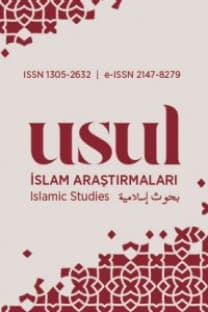Dil ve Belâgat Yönüyle Ebüssuûd Efendi'nin Tefsiri İrşâdü'l-Akli's-Selîm ilâ Mezâya'l- Kitâbi'l-Kerîm -Müşâkele Sanatı Örneğinde-
Ebüssuûd Efendi'nin Arap dili ve belâgatindeki yetkinliği kuşkusuzdur. O bu alandaki görüş ve düşüncelerini özellikle ölümsüz tefsiri İrşâdü'l-‘akli's-selim'inde ifade etmiştir. Ebüssuûd Efendi’yi asıl üne kavuşturan eseri İrşâdü’l-‘akli’s-selîm, yazıldığı günden itibaren ilim ve siyaset çevrelerinin büyük alakasına mazhar olmuş, kısa sürede geniş Osmanlı coğrafyasında Zemahşerî’nin Keşşâf’ı ve Beyzâvî’nin Envârü’l-Tenzîl’inden sonra en çok tutulan tefsir haline gelmiştir. Ebüssûd Efendi tefsirini yazma maksadını, Kur’ân’ın öncelikle edebî inceliklerini vahyin lafız ve mana güzelliklerine yaraşır bir üslupla yeniden tertip etmek olarak belirtmiştir. İki bölümden oluşan bu mütevazı çalışmanın birinci bölümünde İrşâdü’l-akli’sselîm’in Arap dili ve belâgatindeki yerini, ikinci bölümünde ise belâgatte müşâkele sanatının kavramsal çerçevesini verdikten sonra Ebüssuûd Efendi’nin mezkur tefsirinde, müşâkele sanatına konu olan âyetleri yorumunda bu sanatı kullanış biçimi, Zemahşerî ve Beyzâvî’yle karşılaştırmalı olarak ele alınacaktır. Böylece bir mü- fessir olarak Ebüssuûd Efendi’nin belâgat ilmindeki yeri ve katkısı somut verilerle netleştirilmiş olacaktır.
Anahtar Kelimeler:
Yerinde, Müşâkele, Ebüssuûd, Beyzâvî, Zemahşerî.
The Linguistics and Rhetoric Aspects of the Irshad al-'aql al-salīm of Ebussuud Efendi; on the Example of the Art of Mushakala
It is an accepted reality that Ebüssuûd Efendi made significant contributions to the grammar and rhetoric of the Arabic language. He explored his opinions and made contributions in his monumental exegises work Irshād al-‘aql alsalīm. Irshād al-‘aql al-salīm is the magnum opus of Ebüssuûd Efendi that brought him reputation and prestige in particular, achieving great relevance in scientific and political circles, which soon became the most popular exegesis after alZamakhsharī’s Keşşāf and al-Baydāwī’s Envārü't-Tenzīl throughout the Ottoman lands. He explained that he wrote his exegises with the purpose of reconstructing the Qur'an’s especially literal subtleties in a new style worthy of the divine revelation’s verbal and literary beauties. We will examine in this paper the very contributions of Ebussuud in Arabic language and eloquence/rhetoric as it was provided in the Irshad al-‘aql al-salīm on the example of the art of Mushakala, dividing it into two chapters. In the first chapter of this modest work, general information will be given about Irshād al-‘aql alsalīm’s place and importance in Arabic language and rhetoric. In the second chapter, it will describe the Mushakala art’s conceptual framework in the Arabic rhetoric, after which it will investigate Ebussuud’s contributions in the Arabic rhetoric with a concentration on his remarks and explorations regarding the art of Mushakala in comparison with al-Zamakhsharī and al-Baydāwī’s opinions, to be able to bring out Ebussuud’s contributions in the Arabic rhetoric on the basis of concrete evidences.
Keywords:
Yerinde, Mushakala, Abussuud, al-Baydawi, al-Zamakhshari,
- ISSN: 1305-2632
- Başlangıç: 2004
- Yayıncı: İSTANBUL SABAHATTİN ZAİM ÜNİVERSİTESİ
